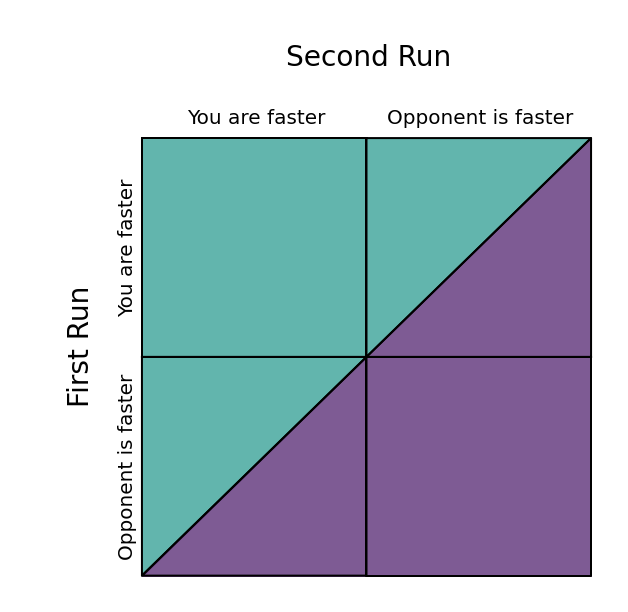Solution¶
Let $y_1$, $o_1$, $y_2$, and $o_2$ represent your and your opponent's 1st and 2nd run times. We know that all four follow the same normal probability distribution. It is given that $y_1 < o_1$.
Let $d_1 = o_1 - y_1$ and $d_2 = o_2 - y_2$ represent how much faster you are than your opponent in each run. The difference of two independent normally distributed variables is also normally distributed.
Finally, let $s = d_1 + d_2$ represent the sum of the difference for both runs. The sum of two independent normally distributed variables is also normally distributed.
The problem can be summarized as the conditional probability that $s > 0$ given $d_1 > 0$.
Case 1 : $d_2 > 0$¶
You are faster than your opponent in the second run, so $s > 0$ is a certainty. Since $d_2$ is normally distributed, this is $\dfrac{1}{2}$.
Case 2 : $d_2 < 0$¶
Your opponent is faster than you in the second run. Since $d_2$ is normally distributed, this is also $\dfrac{1}{2}$.
Since $d_1 > 0$ and $d_2 < 0$, $s > 0$ and $s < 0$ both occur with an equal probabilty of $\dfrac{1}{2}$ because of symmetry.
In other words, given your opponent does better in the second run, you will still win the gold $\dfrac{1}{2}$ the time.
Answer¶
Adding up the two cases yields:
$$\dfrac{1}{2} + \left(\dfrac{1}{2} \right) ^2 = \dfrac{3}{4}$$
Note the runs and results of the winner can be summarized with symmetry. The answer is the teal area in the first row.

Extra Credit¶
Assuming all 30 finalists are evenly matched, have the same normal probability distribution, and have indepenent first run and second run times, the probability of you winning the gold is:
$$\left(\dfrac{3}{4} \right) ^{30} \approx 0.00018$$Rohan Lewis¶
2021.01.24 (Picture Update on 2021.01.26)¶
Code can be found here.